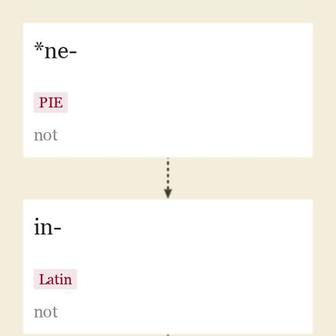indeliberation (n.)
1610年代; 见 in-(1)“不,相反的”+ deliberation。
最早记录年份: 1610s
indeliberation 的相关词汇
deliberation (n.)
14世纪晚期, deliberacioun,“权衡和检查的行为”,源于老法语 deliberation,源于拉丁语 deliberationem (代表格 deliberatio ),从 deliberare 的分词词干中衍生出的名词,其原意为“认真考虑,咨询”,字面上为“权衡”, de, 在这里可能指“完全”(参见 de- ),加上 -liberare,该词被改编(可能受到 liberare “释放,解放”影响)自 librare “平衡,使平稳”,源自 libra “一对天平,天平”(参见 Libra )。德·范写道,“ Dēlīberāre 必须归因于 libērāre ‘释放’对 *dē-librāre ‘权衡’的影响。”
“行动或决策缓慢”的意义源于15世纪早期。意思是“彼此讨论并审查赞成或反对某项措施的理由”始于15世纪晚期。
in- (1)

这个词缀的意思是“不,相反,没有”(也可以是通过与后面的辅音音节化的 -n- 的同化而来的 im-, il-, ir-,这种趋势始于后期拉丁语),源自拉丁语 in- “不”,与希腊语 an-,古英语 un- 同源,均来自 PIE 词根 *ne- “不”。
在古法语和中古英语中,通常使用 en-,但大多数这些形式在现代英语中已经不再使用,只有极少数(例如 enemy)不再被视为否定的。在英语中的经验法则是,对于明显的拉丁语元素使用 in-,对于本土或本土化的元素使用 un-。